-
4 Tips for Helping a Loved One with Anxiety
- Posted on March 10, 2021
- by admin
- in All Articles, Mental Health, NFSB Blog
- Comments Off on 4 Tips for Helping a Loved One with Anxiety
 In the previous blog article, we discussed what an anxiety disorder is, the most common symptoms of anxiety disorders, why anxiety disorders are so prevalent, and what can happen when anxiety is left untreated. Anxiety was already the most common mental illness in America before COVID-19, which has caused even more anxiety among adults and children.
In the previous blog article, we discussed what an anxiety disorder is, the most common symptoms of anxiety disorders, why anxiety disorders are so prevalent, and what can happen when anxiety is left untreated. Anxiety was already the most common mental illness in America before COVID-19, which has caused even more anxiety among adults and children.Seeing a family member or close friend struggle with anxiety can be heartbreaking. If you suspect a loved one has an anxiety disorder, the natural instinct is often to jump right in and help. While your heart is in the right place, be sure to give some extra thought to your approach so your offer to help is well-received.
Here are four tips for helping a loved one with anxiety.
1) Avoid using the word “anxiety.”
If you approach your loved one and say, “I think you have anxiety,” they might get defensive and think you’re being judgmental.Instead, say something like, “I noticed you didn’t want to get together the last few times I asked. Is everything okay? Is there anything you want to talk about?”
A gentler approach could make someone more open to expressing their feelings. Sometimes simply speaking to a friend or family member can release anxiety.
2) Check in on a regular basis.
Some people don’t like to talk on the phone, which just creates more anxiety. In that case, send your loved one a text. Ask what they’re doing today. See if they want to get together. Offer to do something that you know your loved one enjoys or gauge their interest in trying something new.3) Encourage Better Self-Care.
Given the direct connection between physical, mental, and emotional well-being, taking better care of oneself helps virtually any condition.Someone who recently came to see us at Nutley Family Service Bureau (NFSB) was dealing with job-related anxiety. As part of her treatment plan, we recommended deep breathing exercises. Inhale peace and tranquility, hold for a second, and exhale stress and anxiety. Something as simple as taking deep breaths became her go-to technique when she needed to calm down.
Of course, what works for you may not work for your loved one. Help them discover activities that not only involve physical exercise but nourish their soul and give them peace.
4) Rediscover Routines.
Between stay-at-home orders, remote working, and virtual schooling, the pandemic has taken millions of people out of their routines. This can add to the stress felt by someone with an anxiety disorder.Routines help hold people together when they have trouble keeping it together themselves. Encourage your loved one to get back into a routine – getting up at a certain time, having breakfast, getting the kids set up for school, having lunch, exercising, etc. Of course, helping a loved one get into a routine is easier when you live with that person.
NFSB Is Here for You… and Your Loved Ones.
If you suspect that your loved one is struggling with anxiety and would benefit from speaking with a professional, we can help. Visit our website to find out about the services and resources we provide, or contact us for more information.
If you enjoyed this article please consider sharing it!

















